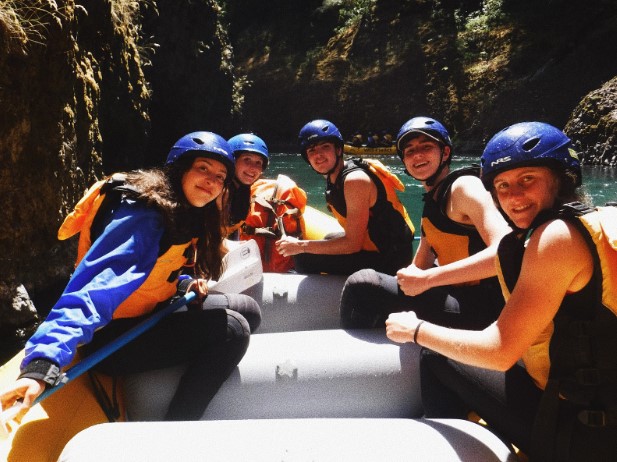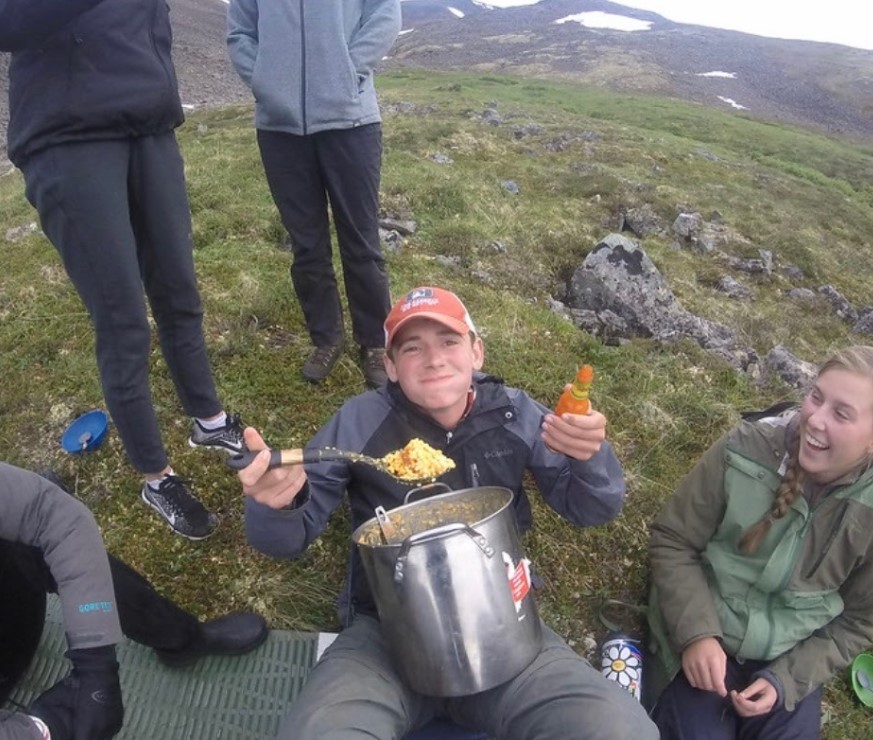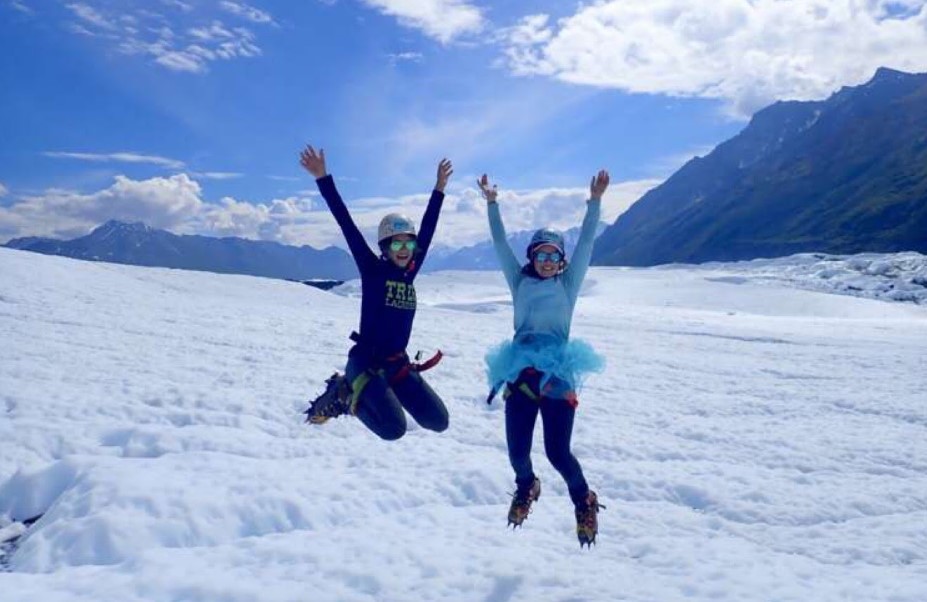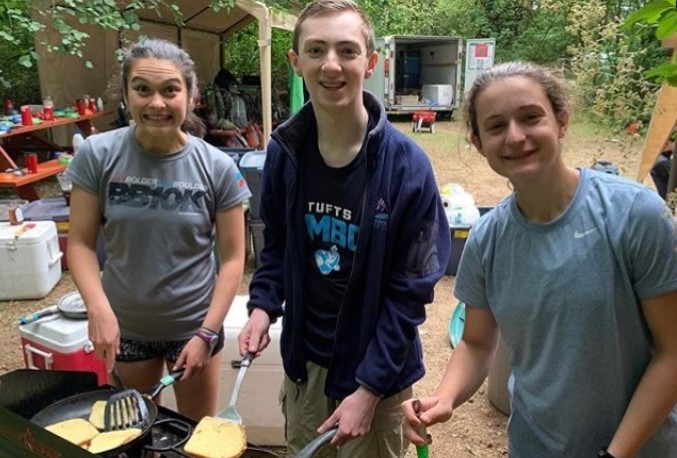Why Adventure Treks is More Critical Than Ever: Thoughts from AT Alumni
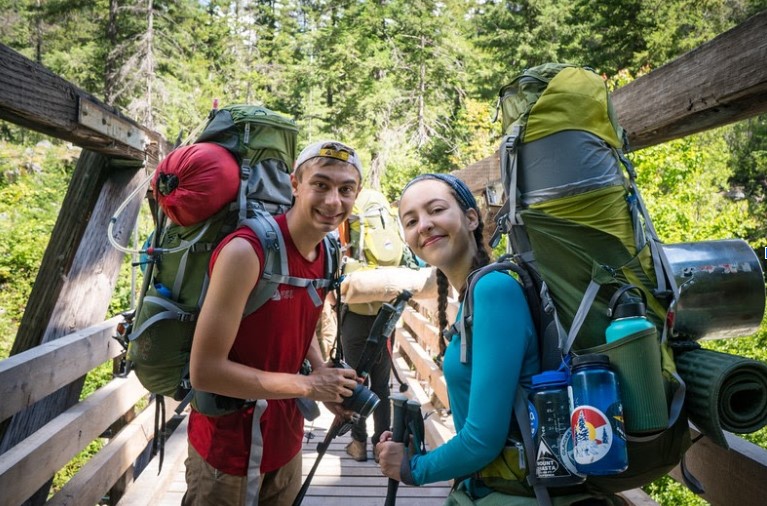
So my fellow alumni and I reached out to the Adventure Treks office to see how we could help, and we decided the best way was to write to future, current, and past members of the AT family. It is our goal to both share what AT means to all of us and what we have learned, and also to remind everyone of the warmth of Adventure Treks and why now, more than ever, experiences and communities like this are critical.
So without further ado, meet Magdalena Arias, Trey Morris, Claire Olson, Ali Pensky, and Sophia Trone—all fellow members of the Leadership Summit 2019 family!
Brandon Schoenfeld (4 trips, 2015–2019; University of Vermont)
Lessons I’ve learned
It is made clear from the beginning that at Adventure Treks, sometimes things are out of our control and we will be forced to re-schedule, modify, or occasionally cancel a part of a backcountry trip. For me, the first time I experienced this was on my first trip in British Columbia (highly recommended!), when we got bogged down by rain during our Wells Gray backpack. We reworked our itinerary to a day hike to nearby Battle Mountain; unfortunately, halfway up the mountain, the rain returned and we had to turn back. In the end, it was a day spent in the tents playing cards. Think the day was ruined? Absolutely not! Clever instructor magic mixed with a set of Monopoly Deal cards made this day one of my favorite memories. On my third trip in Alaska, I unexpectedly learned the entire history of Whittier, AK, because weather pushed back the start time for our Prince William Sound kayak, so we spent the time at the town museum.
As a member of the class of 2020, I, like many others, have lost many “final things.” Despite what I may say to my mom, this hasn’t been easy. I have lost out on my graduation, my last school show, my last youth group weekend, and countless traditions and culminating experiences that seniors are supposed to enjoy. This “stolen from you” kind of loss can leave you angry and resentful. But I cannot say I have actually felt that way. Don’t get me wrong—I am sad. I’ve had my fair share of tears. But I’ve made peace with the situation, the most valuable skill I learned at Adventure Treks. I now embrace loss as an opportunity and work the situation as well as I possibly can. Adventure Treks taught me to accept, embrace, and even benefit from loss and move forward. In short, AT taught me how to make peace.
What AT means to me
Despite this blog being my idea, I struggled with this prompt. Adventure Treks means so much to me in so many different ways, and finding the words to capture that felt impossible. As a 14-year-old, I was socially awkward and pretty timid. While I was excited about the idea of an AT trip, flying across the country alone and making new friends was more than a little overwhelming. When I landed in Seattle for my first trip (British Columbia) and was met by instructor Kiko Sweeney (who I would go on to have three trips with) jumping up and down and waving decked out in full AT gear, I knew I was in for an experience unlike anything I had ever had.
Within hours, I had made friends that I felt closer to than some kids I had known my whole life. That trip opened me up and showed me the world outside of the mid-Atlantic bubble I had grown up in. Over the following three summers (Ultimate Northwest, Alaska Expedition, and Leadership Summit), I would go on to climb mountains (shoutout to Mt. Adams for being the best/worst experience of my life), whitewater kayak, ice climb the majestic Matanuska Glacier, and follow an ecosystem from the summit of Mt. Olympus down the Hoh River all the way to the Olympic Coast. All of this I did with fantastic communities who would go from strangers to family in a matter of days.
Recently, I met up with Kiko for coffee when she happened to be in town. Last fall, during a layover in Atlanta, Pierce Jenkins drove to the airport at 4 a.m. to catch up and hang out for an hour. Over winter break, I was in Orlando with family and got to meet up with Trey Morris, Liam Kugler, and Ali Pensky to spend the entire day on the beach. When I met Owen and Samantha Rice, both AT students, at youth group a while back, having never been on a trip together, we were instantly bonded as if we had been friends for years. The list of these impromptu reunions goes on and on, girded by the chance for an impromptu hike with Sophia Trone, Becky Barsky, and Kyle Crichton (who live in the neighborhood). So, is my AT adventure over? Clearly not! In some ways, it’s only just begun. The lifelong bonds have provided me with a loving family that I have and will forever be able to count on. To me, Adventure Treks means family.
 Magdalena Arias (5 trips, 2015–2019; Williams College)
Magdalena Arias (5 trips, 2015–2019; Williams College)
Lessons I’ve learned
One of the biggest things Adventure Treks has taught me through the years is how to develop friendships and companionships with other people. Interacting with brand-new people every summer has made me less shy and more open to new experiences. It’s also taught me how to maintain those friendships once the summer is over, something I’ve found to be so useful in both my Adventure Treks and high school friendships now that I’m at Williams. Because of AT, I’ve also become really good at understanding group dynamics and how my actions impact other people. At home, I’m now much more aware of others and what I can do to improve situations of conflict. And being from Panama, Adventure Treks has improved my English!
What AT means to me
Adventure Treks is, and has been in many ways, the companion to my adolescence. It was the summer friend, the one I could forget my troubles from back home with, even if it was just for what felt like a fleeting moment. But however short, however fleeting, every summer at Adventure Treks was witness to some of my largest personal growth. Adventure Treks is the net that caught me and sent me back up, higher and higher each time. It’s the reason I’m not afraid to jump high, because even if I know I might fall, I also know I can pick myself back up and try jumping higher each time.
Trey Morris (4 years, 2016–2019; U.S. Military Academy West Point)
Lessons I’ve learned
Adventure Treks is not something that ends with the conclusion of your trip. It is something each and every one of us carries through our daily lives. AT has had a profound effect on who I am and what I am going to do with my life. Starting from my very first AT trip five years ago, I learned that happiness is not merely derived by doing what is comfortable and, at that moment, “fun.” It instead can be found by doing what is difficult. In high school life, this meant I pushed myself to my limits daily in my athletics (cross country and track), because I discovered that there is no better feeling than knowing I put everything I had into pursuing my goal. That feeling is one I found on my first backpacking trip while my smile chattered from the cold as I gazed happily down from the peak of Mt. St. Helens.
However, it is nothing considered to the community I discovered. Adventure Treks became my first “home away from home.” It’s a community where everyone supports one another, and we all cooperate to help everyone succeed. For example, I’ve witnessed friends stealthily taking the weight from one another’s backpacks—not for any credit, but just to help out those who were struggling. It is that familial bond that makes AT so special, and that which I carry with me the most at home. Reminiscing about the selflessness shown everyday at AT inspires me to try to mirror that in my everyday life.
What AT means to me
Adventure Treks is more than an experience. It is a community and way of life. I still talk to the same friends I made almost five years ago. The friendships forged through a month at Adventure Treks feels like those that take years to create. They also are what I remember and love most about my trips.
In comparison, summiting mountains, backpacking through Alaska, and ice climbing a glacier are all inconsequential. Being blessed to be a part of such an incredible community has been one of the greatest privileges of my life. I will forever be thankful to have 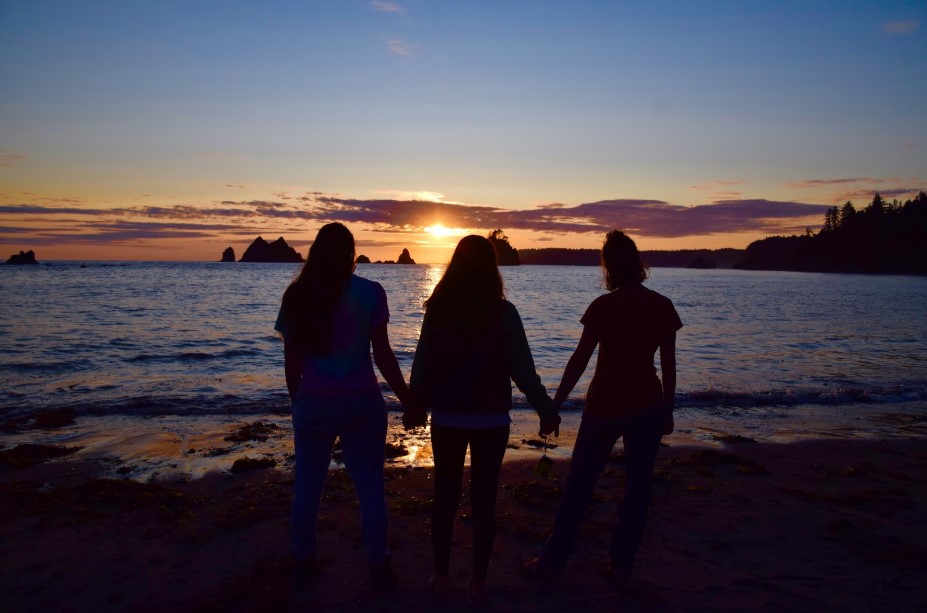
Claire Olson (4 trips, 2016–2019; Occidental College)
Lessons I’ve learned
To call AT a formative experience would be an understatement. AT taught me more about myself than I think I’d like to know. The four trips I did showed me every part of myself, and taught me to love every bit of it—even the parts I’d rather forget. Pushing myself into experiences that at the time were so outside of my comfort zone taught me that I was stronger than I ever thought I could be, and capable of the most incredible things. I know the friends I’ve made over the last four years are for forever. They proved to me that I could show everything, even the ugly bits of myself, and still be loved. AT was one of the first times I felt truly understood and accepted, and I love my outdoor family more than anything. It’s amazing to me that trips like this can foster friendships that last forever after just a month. My friends taught me how to not only trust others but trust myself as well, and for that I am eternally grateful.
I have brought so many of my leadership skills from AT home. For one thing, they have made group projects significantly easier. I used to feel awkward and bossy in leadership roles, and worry about how I was perceived by my peers. But after going to AT, I’ve learned to embrace my confidence and leadership ability. In addition to that, AT has taught me how to deal with really hard situations. Whether it’s alpine starts for summit attempts or an unplanned stomach virus quarantine (jeez, that was a sign for sure), AT taught me one of the most important survival skills I’ve ever learned: embrace the suck. Sometimes stuff really sucks, and you just have to embrace it and stay positive. I remember that at least four times a day in quarantine.
Thank you so much, AT, for everything. <3
Ali Pensky (6 trips, 2014–2019; American University)
Lessons I’ve learned
The four main lessons I learned at Adventure Treks are that you should hang out with people that make you happy, go outside as much as you can, lead by example and vocally, and cook.
At AT, the community is strong due to the fact that everyone feels comfortable being themselves. We are just a bunch of kids trying to adventure outside and get to know the people around us on a deep level. When I go home after an AT trip, I try to take with me the mindset of hanging out with people who challenge me and who I feel comfortable around.
Before AT, I liked being outside, but my family is not very outdoorsy. AT brought out my love for everything outside. It also taught me how to be a leader, whether that means bringing positive energy to a rainy day of backpacking or participating in a group discussion.
After AT, I started combining random ingredients and cooking it on the stove, like we sometimes do at AT. For the most part, it turns out pretty well! I will always be thankful for my time with AT and all I learned.
Sophia Trone (3 trips, 2017–2019; Williams College)
What I’ve learned
One lesson I learned at AT is how to problem-solve in a group setting. In the food crew on Leadership Summit, we planned meals and grocery shops with our instructor, Jake, acting as a supporting member of the team—not the instructor. Jake took a step back and was there to answer questions, but he let us problem-solve together to learn about the responsibilities of buying food for a backpack and for frontcountry meals.
I also learned how to handle disappointment in a mature way. Forgetting snacks and other meal ingredients on a backpack is disappointing, but we made the best of the situation and chose to not complain; instead, we knew to bring more snacks and double-check our bear cans for the next backpack.
Lastly, I learned how to befriend new people quickly. During my first summer, I did not know anyone prior to the trip. However, on the first day I quickly started talking to people and made new friends.
I have taken these lessons with me to high school and beyond. AT has taught me how to work efficiently and disagree respectfully in groups. Learning about how to handle disappointment is imperative for college decisions and other grades, and it helps me realize that these measures do not define me as a person. I have emerged from AT much more social and confident than I was before, and I am excited, not scared, to meet new friends in college.
What AT means to me
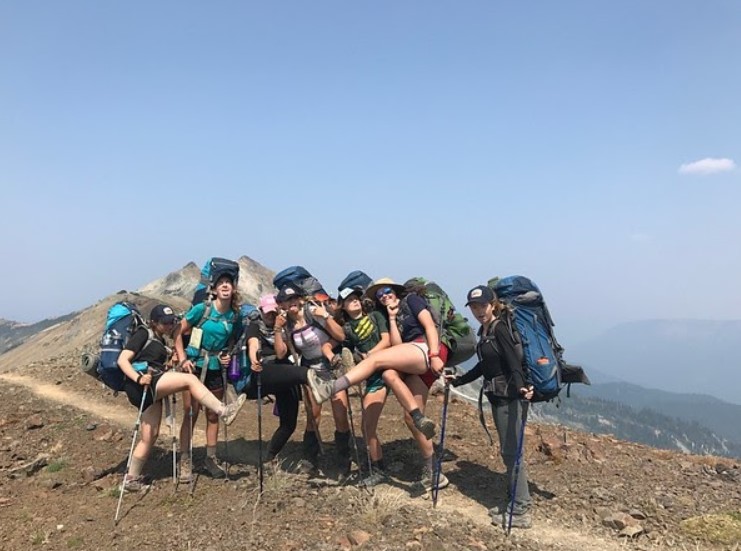
One of my fondest memories from Alaska (my second trip): Rappelling down too fast, I lost my footing and found myself hanging upside down on a glacier. Fortunately, my harness was secure and connected to the anchor embedded in the 10,000-year-old ice. As my eyes moved from the steep drop to the pool of water below, I felt a sense of panic. It was a beautiful landscape, but at that moment, I was not interested in beauty, just survival. Immediately, the ice climbing guides began lowering me to safety. My trip leader came over to encourage me to try again. This scene perfectly encapsulated why I love the outdoors: it’s a place where I can encounter the unexpected, meet challenges, learn new skills, and see the world in a new light.
In recognition of my struggles and the sheer volume of my blood-curdling scream, I was nominated for “Jerry of the day,” which is a way to playfully recognize the biggest fail of the trip. My instructors also recognized my perseverance in the face of a difficulty and my willingness to push past fear and try the climb again. It was a reminder of the greater lessons to be learned in challenging situations and made me understand that sometimes I must take a risk in order to reach new heights.
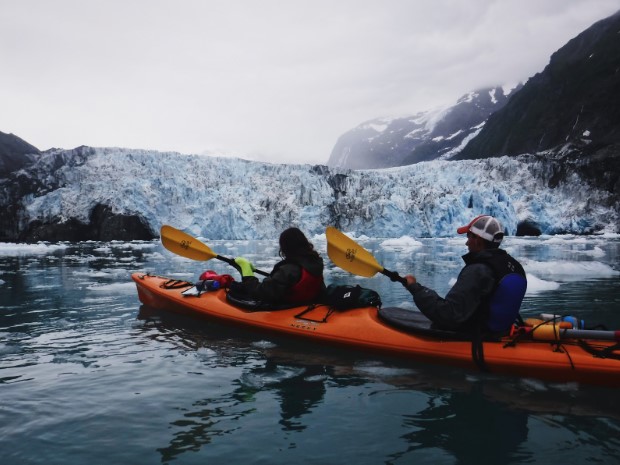
I have joined groups to explore the outdoors from Alaska to New Zealand to California and back home. I have hiked up and down the West Coast. In addition to conquering the physical demands of trails, being in the wilderness has taught me how to make friends with all kinds of people. The telling and retelling of stories is an important part of these trips and creates lasting memories. Listening to others’ adventures reminds me that I am not the only one who has felt fear while crossing a cold and raging river, or the only one who has had to overcome exhaustion on a long backpack. By sharing our stories, we formed a bond as strong as the rope that connected me to my ice climbing guide on that Alaskan glacier, and those bonds remind me that I can overcome fear and doubt, and climb ever higher.
As I consider my love for the outdoors, my mind wanders about how I can incorporate my passion into my college studies. In my high school AP French class, I created a video that examined the French and American government’s response to climate change and researched how rising temperatures could lead to dramatic flooding. The project inspired me to adopt more of a global perspective on international issues. I now see myself pursuing environmental science and taking a multifaceted approach to understanding climate change. Despite political differences, we must remember that care and understanding of our environment is a global issue. I am excited to pursue the sciences and discover more about our physical world.

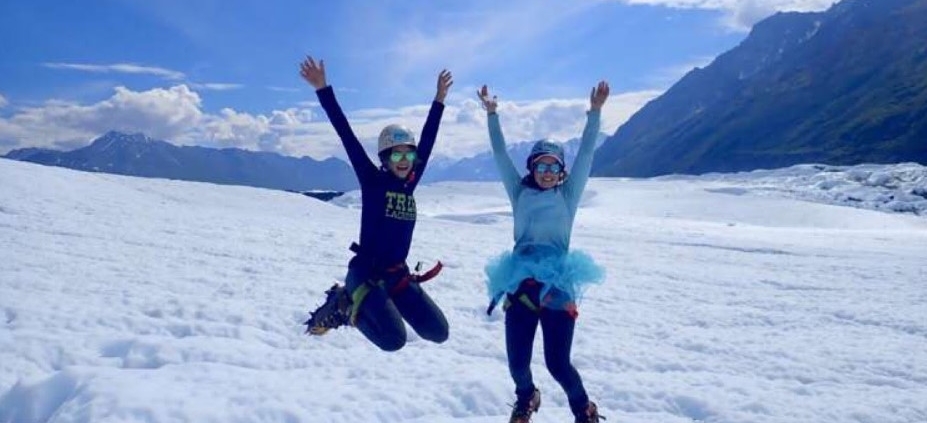
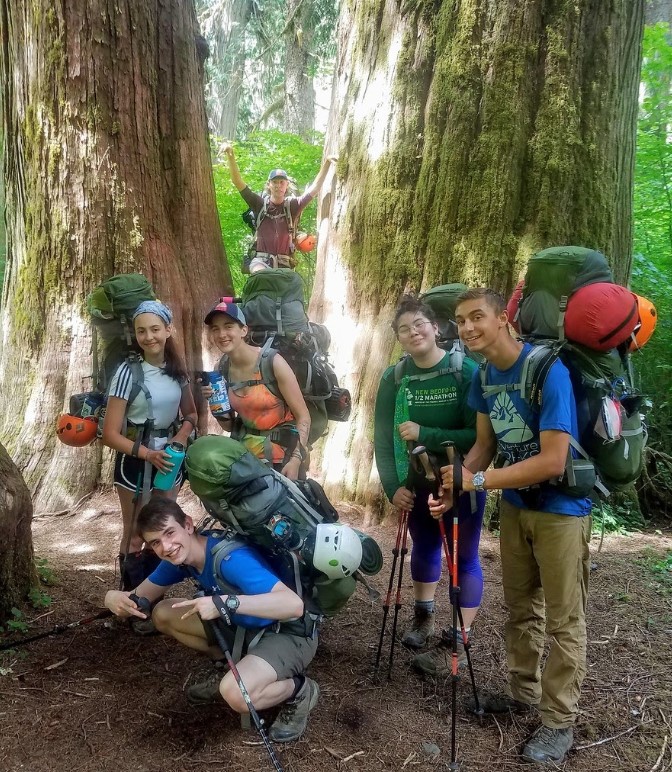
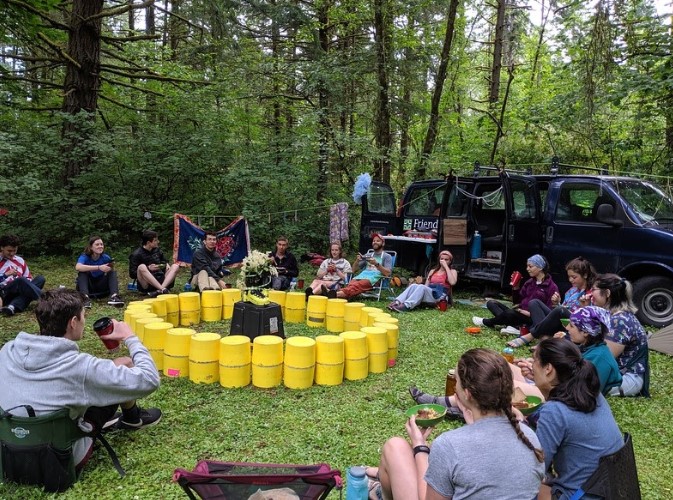
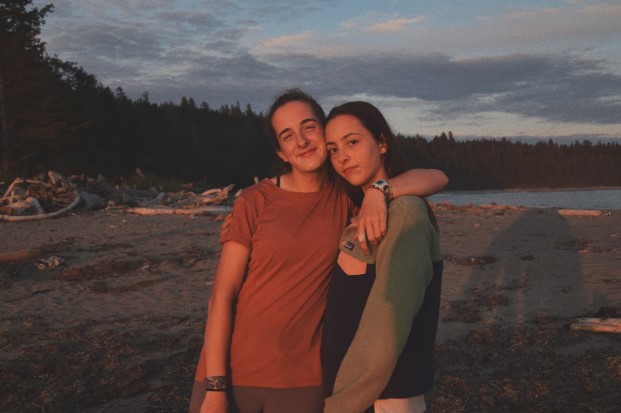 Magdalena Arias (5 trips, 2015–2019; Williams College)
Magdalena Arias (5 trips, 2015–2019; Williams College)